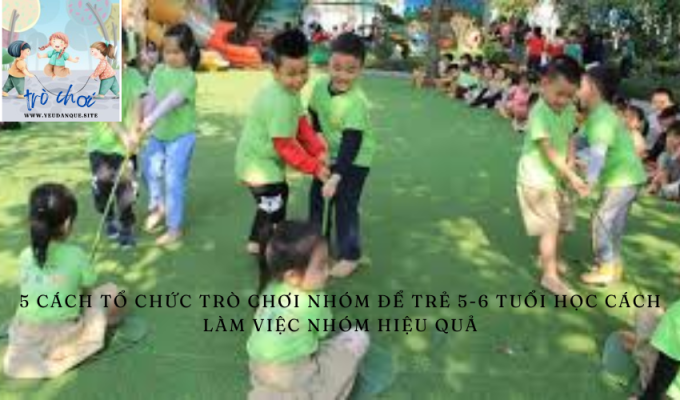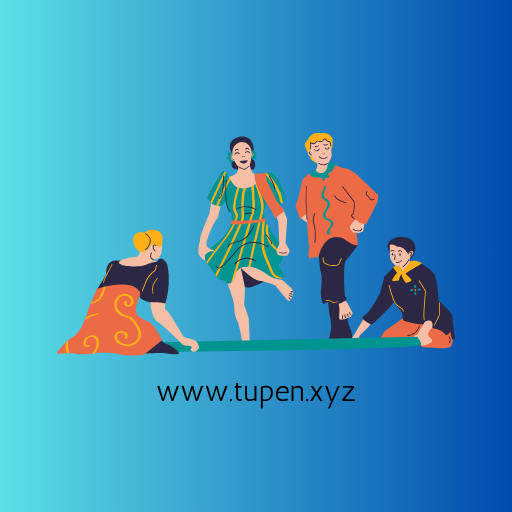“Fun ways to organize group games to help 5-6 year old children learn how to work effectively in groups”
1. Introduce the importance of learning how to work in groups for 5-6 year old children.
Learning to work in groups from an early age helps children develop communication, cooperation and sharing skills. These are important skills so children can confidently express themselves and build good relationships with others.
2. Benefits of learning to work in groups for 5-6 year old children:
– Practice communication and collaboration skills
– Build team spirit and trust in each other
– Develop the ability to listen and share opinions
– Learn how to resolve conflicts and negotiate
3. Teambuilding activities suitable for children 5-6 years old:
– Character guessing game
– Tug of war
– Hit the table tennis ball
– Make mosaics
– Jumping sack challenge
– Kick the ball into the goal
Participating in teambuilding activities will help 5-6 year old children develop comprehensively both social and physical skills.
2. Analyze the benefits that organizing group games brings to children's development.

Practice teamwork skills
Participating in teambuilding games helps children practice teamwork skills, learn how to coordinate and support teammates to accomplish common goals. This is an important skill that helps children develop team spirit and be ready to cooperate in a social environment later.
Connect and love nature more
Teambuilding games are often held outdoors, giving children the opportunity to contact nature, enjoy open spaces and create connections with nature. This helps children develop a love and interest in their surroundings.
Build a spirit of solidarity and independence
Participating in teambuilding games helps children develop a spirit of solidarity, learn to be independent and face challenges. These games create opportunities for children to experience, learn and develop important skills in life.
The above benefits are what organizing group games brings to children's comprehensive development.
3. Present 5 ways to organize appropriate group games for 5-6 year old children to learn how to work effectively in groups.
Method 1: City building game
– Prepare building blocks such as bricks, square and rectangular blocks.
– Divide children into small groups and assign each group an area to build a city.
– Ask groups to coordinate to build a complete city with buildings such as houses, schools, and hospitals.
Method 2: Boat racing game
– Arrange plastic or paper boats and prepare a basin of water.
– Divide children into teams and ask them to coordinate to get their boat across the finish line first.
– This game helps children learn how to work in groups to achieve common goals.
Method 3: Bridge building game
– Prepare ice cream sticks and pieces of paper for children to build bridges.
– Divide children into groups and ask them to build bridges from popsicle sticks and paper to cross a piece of land or a small stream of water.
– This game helps children learn how to coordinate to create a sturdy structure.
The above methods help 5-6 year old children learn how to work effectively in groups while still ensuring education and fun.
4. Describe specifically each way of organizing group games and why they can help children develop teamwork skills.
Character guessing game
– Description: In this game, children will be dressed up as cartoon characters and their teammates will have to guess which character they are.
– Reason: This game helps children practice communication skills, enhance recognition and quick reflexes.
Tug of war game
– Description: This game requires teams to participate in tug of war to demonstrate group strength.
– Reason: When participating in this game, children will learn how to coordinate and work in groups to achieve goals, thereby practicing teamwork skills.
Table tennis smashing game
– Description: In this game, teams will smash the ping pong ball together to win.
– Reason: This game helps children practice coordination skills, enhance cohesion and team spirit.
This will help children develop teamwork skills, enhance communication skills and practice independence.
5. Compare and evaluate the effectiveness of each way of organizing group games so that 5-6 year old children learn to work in groups.
How to organize group game 1: Guess the character
– This game helps 5-6 year old children develop communication skills and logical thinking when having to describe and guess specific objects.
– However, it is necessary to pay attention to choosing characters suitable for the child's age so that the game is not too difficult or too easy.
How to organize group games 2: Physical training – tug of war
– Tug of war games help children practice muscle strength and learn how to work in groups to achieve common goals.
– However, it is necessary to ensure children's safety and supervise carefully to avoid injury.
How to organize a group game 3: Ping ping pong
– This game stimulates children's agility and reflexes, and helps them learn how to try and conquer challenges.
– However, attention should be paid to the safe use of balls and objects to avoid accidents.
All ways of organizing group games have their own effectiveness, however, the most important thing is to ensure safety and appropriate nature for the child's age.
6. Point out things to pay attention to when organizing group games for 5-6 year old children, including how to choose appropriate toys, time and space.
How to choose toys:
– Choose games suitable for children's age and interests, ensuring safety and education.
– Toys should stimulate curiosity, creativity and encourage children to participate in group activities.
Suitable time and space:
– Determine the time to organize the game to suit the child's study and rest schedule.
– Choose a spacious, safe and airy space so children can move freely and participate in group activities comfortably.
It should be noted that organizing group games for 5-6 year old children needs to be done under the supervision of an adult with experience and knowledge of child development.
7. Discuss ways to create an environment that promotes cooperation and communication in group games.
Promote collaboration:
To create an environment that promotes cooperation in team games, we can use games in which each team member must coordinate with each other to complete the task. This will help children understand the importance of teamwork and cooperation to achieve common goals.
Promote communication:
During group games, we can discuss ways to encourage children to communicate effectively. This can include using simulation games or role-playing games to encourage children to express their opinions and listen to the opinions of others.
Here is a list of activities that can promote cooperation and communication in group games:
– Character guessing game
– Tug of war
– Hit the table tennis ball
– Assemble paintings from puzzle pieces
– Jumping sack game
– Animal racing reduces voice
– Game of kicking the ball into the goal
Using these games will help children develop teamwork and communication skills in a positive way.
8. Propose methods to evaluate results after organizing group games to check children's progress in learning how to work in groups.
Evaluation method through observation:
– Observe children's behavior while participating in group games to evaluate their ability to cooperate, interact and solve problems together.
– Recognize the active participation, sharing of opinions and roles of each child in the group.
Evaluation method through interview:
– Interview children after group games to collect children's opinions, thoughts and feelings about the experience of participating in the group.
– Ask questions about how children solve problems, pay attention to their friends' opinions, and feel about working in groups.
Evaluation method through reports from teachers:
– The teacher observes and records the children's behavior, knowledge, and teamwork spirit during the game.
– Review children's progress based on their ability to cooperate, interact and solve problems in groups.
For each assessment method, ensuring accuracy and objectivity in the information collection process is very important to be able to evaluate children's progress after participating in group games.
9. Summarize the strengths and weaknesses of organizing group games so that 5-6 year old children learn how to work in groups and suggest improvements.
Strengths:
– Group games help 5-6 year old children practice communication and cooperation skills with each other.
– Group activities help children develop a spirit of solidarity and build teamwork skills from an early age.
– Group games provide a fun and exciting environment for children to learn and develop.
Weaknesses:
– There may be excessive competition between children when participating in group games.
– Some children may feel pressured to participate in group activities.
Improve:
– Increase praise and encouragement for children when participating in group games to create positive motivation.
– Make sure that group games are designed so that children have the opportunity to express themselves and do not put too much pressure on them.
Organizing group games for 5-6 year old children is an important part of developing social and mental skills for young children. To achieve the best results, it is necessary to consider and adjust group activities to suit the characteristics and developmental needs of children.
10. Conclusion and proposed solutions to promote learning how to work in groups for 5-6 year old children through group games.
Recommended solution:
- Organize teambuilding games for children in preschool, during extracurricular activities or class meetings.
- Use group games as part of an early education program to help children develop communication skills, solidarity and independence.
- Periodically organize group play sessions so children have the opportunity to practice teamwork skills and coordinate with friends.
Promoting learning how to work in groups for 5-6 year old children through group games will help children develop better socially, mentally and physically. At the same time, practicing teamwork skills from an early age will also help children become more confident when exposed to the social environment later.
Organizing group games for 5-6 year old children is an effective way to help children learn how to work in groups, develop communication and cooperation skills. Through games, children will learn how to share, listen and resolve conflicts, thereby developing team spirit and confidence.



